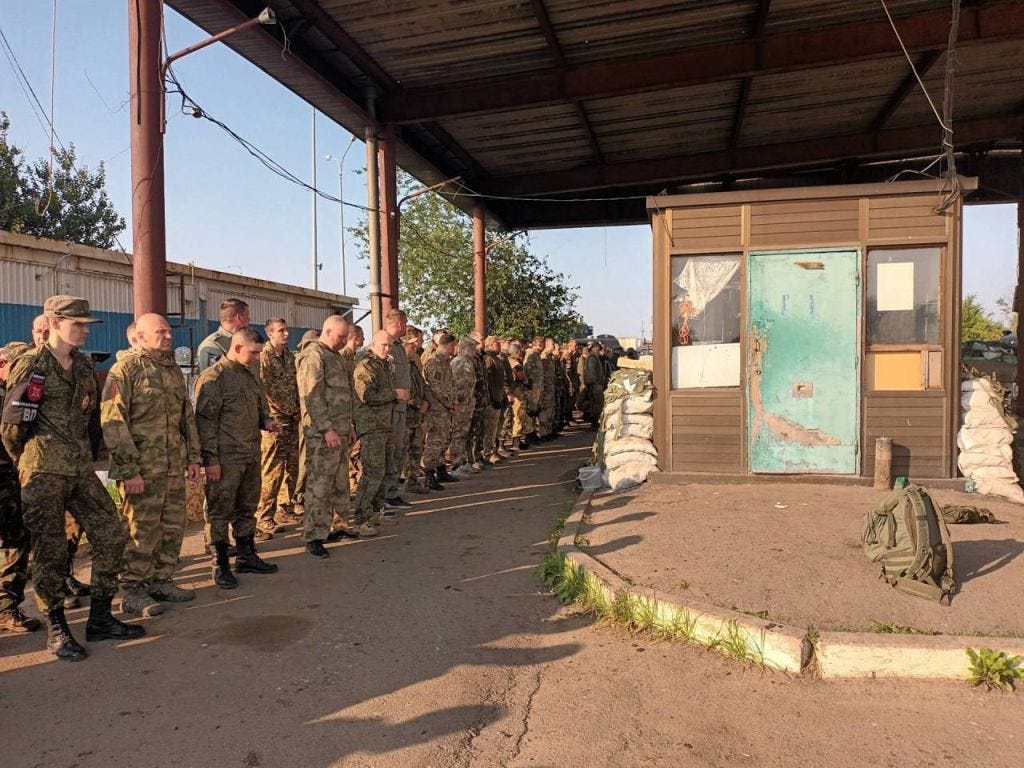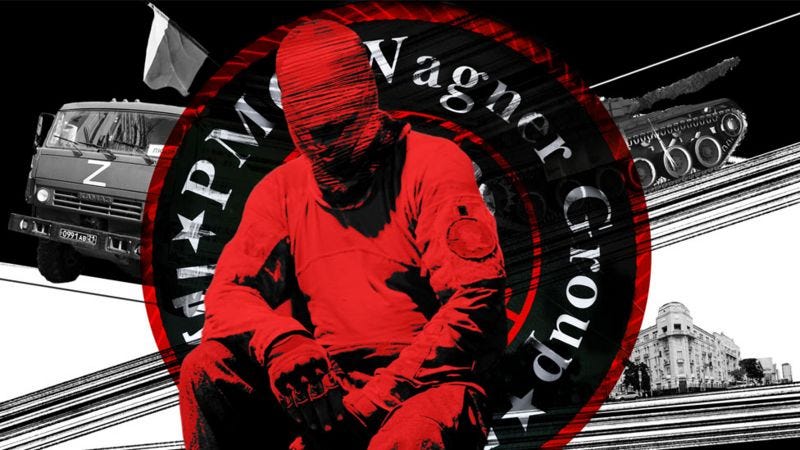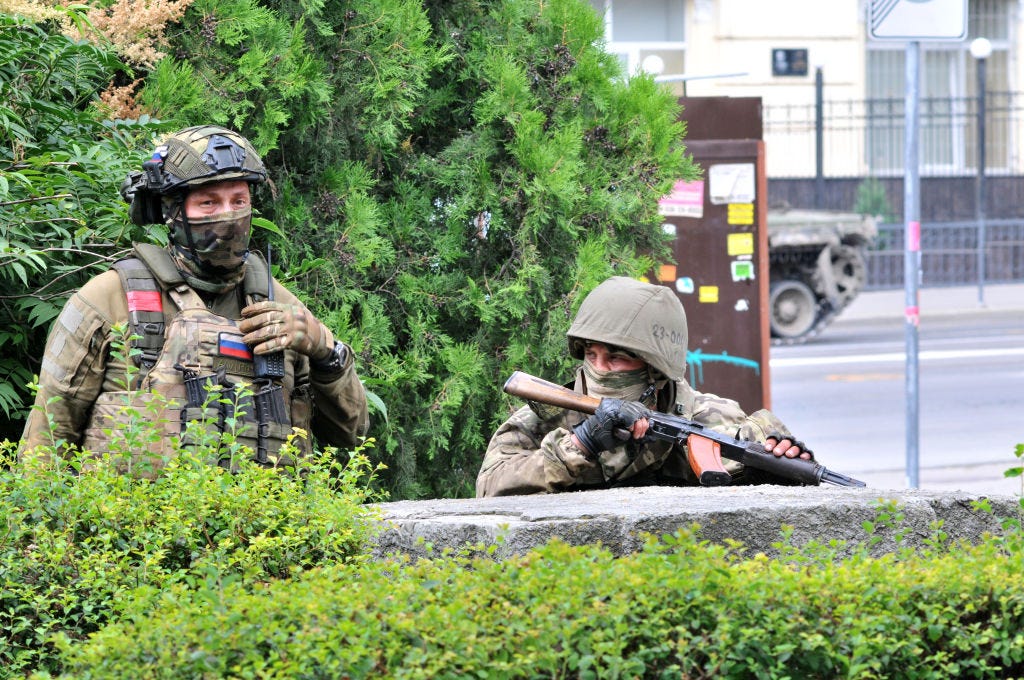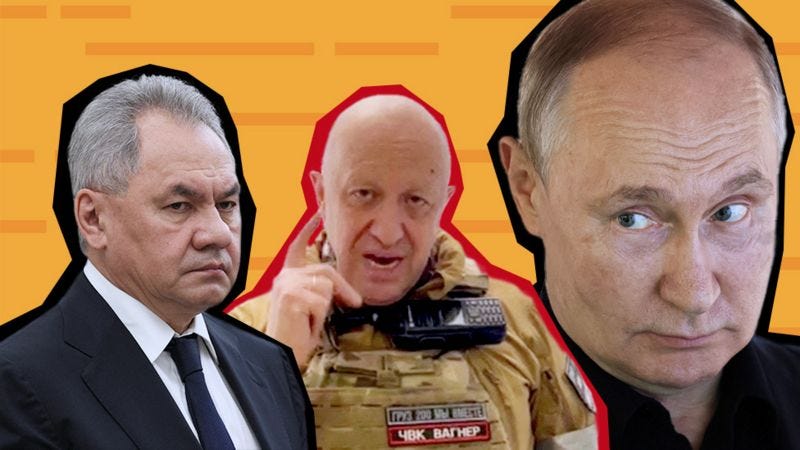My role in the mutiny, by a Wagner fighter
Wagner rank and file had no idea what was going on, and are now waiting further orders, a fighter tells the BBC. Senior commanders say focus now on overseas rotations and plans to deploy to Belarus.
By Anastasia Lotareva.
Three weeks on from the Wagner group’s short-lived mutiny there are still more questions than answers about what exactly happened on 23–24 June, and what the future now holds both for the mercenaries, and their leader Yevgeny Prigozhin. Wagner fighters very rarely speak to the media, but BBC Russian reached out to one lower level commander who agreed to share his experiences with us on condition of strict anonymity.
When Yevgeny Prigozhin moved his troops into the southern city of Rostov in June, Gleb – not his real name – found himself right in the middle of the action.
A junior-level commander previously involved in the fighting for Bakhmut, Gleb and his unit were resting up in a barracks in occupied Luhansk region when they got the call to join a column of Wagner fighters heading out of Ukraine.
The call, early in the morning on 23 June, came from a Wagner commander who Gleb is reluctant to name for security reasons, but who was acting on orders from Prigozhin and the Wagner Command Council.
"It’s a full deployment,” he was told. “We're forming a column, let's move out."
Gleb says no-one was told where the column was heading, but he was surprised to realise that they were moving away from the frontline.
As they headed across the Russian border and into Rostov region Gleb says the Wagner fighters encountered absolutely no resistance.
"I didn't see any border guards,” he recalls. “But the traffic police saluted us along the way."

Telegram channels closely associated with the Wagner group later claimed that border guards at the "Bugayevka" border checkpoint had actually laid down their weapons as the Wagner fighters arrived, and they shared a photo purportedly from the scene showing two dozen unarmed individuals in camouflage.
As they approached Rostov, the fighters were given orders to surround all the law enforcement agency buildings in the city and to occupy the military airport. Gleb’s unit were told to take control of the FSB regional office building in Rostov Oblast.
As they approached the building, it appeared to be completely shut up. They flew a drone up to check for any signs of life, and eventually after half an hour a door opened and two people came out onto the street.
“They said: 'Guys, let's make a deal' and I said: 'What's there to make a deal about? This is our city.’ So we just agreed that we would leave each other alone. They came out to smoke from time to time."
Rostov journalists have reported a similar situation with many government buildings in and around the city. The Wagner fighters would first fly drones over them, and then surround them. No-one was allowed to leave, but delivery couriers were allowed in with food.
No explanation
While all this was going on, the Wagner leader, Yevgeny Prigozhin was at the Russian army’s Southern Military District headquarters, meeting Russia’s Deputy Dеfence Minister, Lieutenant General Yunus-bek Yevkurov, and the Deputy Chief of the General Staff, Lieutenant General Vladimir Alexeyev, to demand that they hand over Chief of the General Staff Valery Gerasimov and Defense Minister Sergei Shoigu.
And another column of Wagner fighters, lead, Gleb says, by Wagner founder Dmitry Utkin, was heading up the main highway towards Voronezh and apparently on to Moscow.
What was going on, the BBC asked Gleb. What was the plan?
"We didn’t have a f***ing clue,” he says. “We learned what was happening from Telegram just like you did.”
As the day went on, pictures of what was happening in Rostov were beamed around the world. People were surprised to see local residents and even local journalists apparently smiling and chatting to some of the normally tight-lipped Wagner fighters occupying their city.
“It was the ex-cons,” says Gleb - referring to the many serving prisoners conscripted into the Wagner group last year. ”Nobody told them not to. Nobody cares about them.”
For core Wagner fighters like Gleb, the rules are much more clearly understood. He told the BBC that back in the spring they had been told by the senior command that anyone who spoke to the media would be “nullified” - i.e.: killed. Several former Wagner fighter have told us the same thing.
On the evening of 24 June, Gleb was contacted by one of his superiors and told with absolutely no explanation, that he and his unit should now return to base in Luhansk.
As they made their way back to barracks they were following the news on Telegram and discovered that criminal charges had been initiated against Prigozhin, and then subsequently dropped, that he was to go to Bеlarus and that according to Putin’s press secretary Dmitry Peskov, the Wаgner fighters would not be held to account for their role in the mutiny, because of their ‘combat merits’.
For Gleb and his unit the future now is unclear. They’ve been told to stay in their barracks in Luhansk and await further orders. Their hosts, the so-called Luhansk People’s Republic authorities, are keen to find out more about their future plans, and in particular to know what will happen to their equipment and ammunition, he says.
Why don’t you just leave? - the BBC asked him.
My contract hasn’t expired yet, he says.
Next stop Belarus?
Since the end of the Wagner mutiny, there have been many unexpected twists and turns to the story.
Last week news emerged, that just five days after the uprising, President Putin had met Prigozhin and 35 senior Wagner commanders in the Kremlin.
It’s not known who exactly the 35 were, but two Wagner commanders known by the their call signs, Zombie and Lotus, who are often referenced by pro-war Russian journalists, have spoken to Telegram channels close to the Wagner group to share their thoughts on what happens next.
"We were all sent on vacation until the beginning of August," said Lotus – otherwise known as Anton Yelizarov.
"Personally, I haven't been to the seaside with my family for 5 years, and other guys are also immersed in family matters now. Giving everyone the opportunity to rest before the big work that awaits us, that's the decision made by the council of commanders."
Yelizarov said this ‘big work’ involved rotating Wagner fighters based in what he called ‘distant locations’. He was presumably referring to places like the Central African Republic, from where it’s been reported that up to 600 Russian mercenaries have been flown home recently. This follows numerous complaints from families of Wagner fighters who had been stuck in various African countries for more than a year despite only having signed 6-month contracts.

Yelizarov also spoke about Bеlarus and the plans to relocate some Wagner fighters there.
"The second and most challenging thing is entering Belarus,” he said. “We need to prepare bases, training grounds, coordinate with local self-government bodies and administrations, organize cooperation with the Belarusian security forces, and establish logistics."
A second commander, Zombie, who the Russian propagandist TV host Vladimir Solovyev has identified as an ex-GRU fighter called Boris, has also been speaking on Telegram about Wagner’s future.
"We are united not only by a contract but also by a common idea: to fight, not just serve our time, to be useful to the Motherland,” he said. “Many consider us mercenaries, but that's not true. We have more patriotism than others. We fight without sparing our lives. And the Leader unites us just as the common idea does."
Zombie was asked if he and his comrades would consider joining the regular army, as has been suggested by President Putin.
"I'll either be with my fighters in the Wagner private military company, or happily relaxing at home in front of the TV. “ he said. “And that's what everyone thinks."
The BBC asked the same question to Gleb, now sitting in Luhansk with his unit.
Not a single person he knows has signed a contract with the Ministry of Defence so far, he said.
Abridged by Jenny Norton.
Read this story in full in Russian here.
What Wagner mutiny means for Putin's Russia
By Amalia Zatari & Andrey Goryanov. The Wagner mercenary group's mutiny shows to the world that the key players in Russian President Vladimir Putin's autocratic system are no longer …
WEEKEND READ: 24 hours that shook Russia - a Muscovite's view of the Wagner mutiny
Last Friday night, I asked the cab driver: is your sat nav working all right? Nowadays, when security in Moscow is heightened, authorities scramble GPS signals and drivers get lost. And that night, security measures were at fever pitch. A thousand kilometres away, Rostov-on-Don, the largest city in the Russian south, was being tak…







